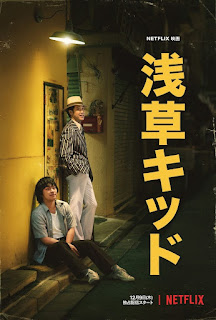Asakusa Kid; or, Make’em Laugh
Listen, Take. Don’t suck up to your audience. You tell them what’s funny.
I have been waiting patiently for over a year and finally the movie is out! I refer to Netflix’s latest production Asakusa Kid, which is based on an autobiographical novel by none other than Takeshi Kitano himself.
Listen, Take. Don’t suck up to your audience. You tell them what’s funny.
I have been waiting patiently for over a year and finally the movie is out! I refer to Netflix’s latest production Asakusa Kid, which is based on an autobiographical novel by none other than Takeshi Kitano himself.
Release Info
Directed by: Hitori Gekidan Starring: Yo Oizumi, Yuya Yagira, Mugi Kadowaki, Honami Suzuki
Language: Japanese Original Title: 浅草キッド Runtime: 123 min
Synopsis
In 1965, young Takeshi (Yuya Yagira) dropped out of college. He searches for work in the popular Asakusa district. He eventually becomes an elevator boy at France-Za, a club owned by Senzaburo Fukami (Yo Oizumi) who is a revered comedian in the vicinity. Takeshi begs Fukami to teach him the art of comedy, and the owner reluctantly agrees. Gradually, Fukami discovers Kitano’s talent for on-stage performances.
In 1965, young Takeshi (Yuya Yagira) dropped out of college. He searches for work in the popular Asakusa district. He eventually becomes an elevator boy at France-Za, a club owned by Senzaburo Fukami (Yo Oizumi) who is a revered comedian in the vicinity. Takeshi begs Fukami to teach him the art of comedy, and the owner reluctantly agrees. Gradually, Fukami discovers Kitano’s talent for on-stage performances.
In Pursuit of Dreams
Asakusa Kid is not so much about the whole career of Takeshi Kitano, but rather it focuses on the legend’s humble beginnings. It is a touching story centering on a relationship between a mentor and his student. We see how “Take” learns tap dancing, performance wit, and comedic timing. Eventually, he becomes “Beat” Takeshi we all know and love, but this kind of transformation comes with a price.
Asakusa Kid is not so much about the whole career of Takeshi Kitano, but rather it focuses on the legend’s humble beginnings. It is a touching story centering on a relationship between a mentor and his student. We see how “Take” learns tap dancing, performance wit, and comedic timing. Eventually, he becomes “Beat” Takeshi we all know and love, but this kind of transformation comes with a price.
If I were to make a cheesy cinematic comparison, I would say that Asakusa Kid is a heartbreaking callback to Rocky V (1990), but the difference is that the movie we discuss is based on real events. Consequently, we are given an insight not only into Takeshi Kitano’s trials and tribulations as a young comedian, but also into the world of Japanese stage comedy of the 1970s. From erotic cabarets to manzai skits, the realm of entertainment outside of Television (which was a groundbreaking novelty at that time) feels stale and outdated. This stark contrast marks a conflict between Master Fukami who clings to the traditional stage and Take who desires to make a name for himself.
I really have to give a shout out to top notch production design. Just as with The Naked Director drama, the viewers are transported back in time to Japan of pre-Bubble era. Interestingly, apart from a closing song by Keisuke Kuwata, we can also hear Takeshi Kitano himself singing the Asakusa Kid song. The music from the master himself really enhances the film’s finale.
With regard to performances, Yo Oizumi really steals the movie with his wonderful portrayal of Senzaburo Fukami. You can’t help but feel the character’s pain, especially in the second half of the story. Additionally, Yuya Yagira is amazing as young (and old) Takeshi Kitano. He got all the tics and mannerisms right. Additional praise goes to supporting actresses, in particular, Mugi Kadowaki as Chiharu and Honami Suzuki as Mari.
Recommendations
All things considered, Asakusa Kid is not about gore, violence, and exploitation, which were so popular in the 1970s. It is a delicate coming-of-age tale about a student who feels indebted to his wonderful teacher. By knowing Kitano’s beginnings, you become more appreciative of his cinematic endeavours. This movie is definitely worth a try.
All things considered, Asakusa Kid is not about gore, violence, and exploitation, which were so popular in the 1970s. It is a delicate coming-of-age tale about a student who feels indebted to his wonderful teacher. By knowing Kitano’s beginnings, you become more appreciative of his cinematic endeavours. This movie is definitely worth a try.
«Enjoyed this post? Never miss out on future posts by following us»







No comments:
Post a Comment
Comment moderation is switched on due to recent spam postings.